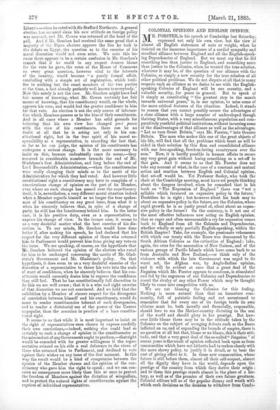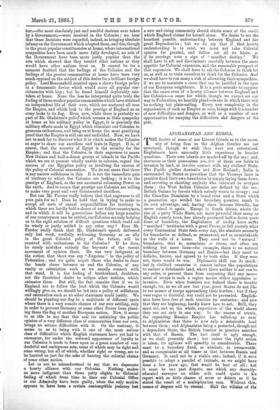COLONIAL OPINIONS AND ENGLISH OPINION.
MR. FORSTER, in his speech at Cambridge last Saturday, expressed not only his own view, but the view of almost all English statesmen of note or weight, when he insisted on the immense importance of a cordial sympathy and steadfast alliance between England and all the English-speak ing Dependencies of England. But we must say that he did something less than justice to England, and something more than justice to the Colonies, when he treated the true solution, whatever it may be, of the question of our alliance with the Colonies, as simply a new security for the true solution of all other political problems. We do not dispute at all that in many respects such an alliance as we desire to see with the Englishspeaking Colonies of England will be one security, and a valuable security, for peace in general. But to speak of it simply as constituting (' the greatest step in the march towards universal peace," is, in our opinion, to miss some of the more critical features of the situation. Indeed, it stands to reason that you cannot possibly secure the advantages of a close alliance with a large number of undeveloped though thriving States, with a very miscellaneous population and comparatively youthful political institutions, without incurring some of the disadvantages of that alliance as well as the advantages. "Let us turn Great Britain," says Mr. Forster, "into Greater Britain. The man who makes this one of the great objects of his life, will find that all the problems which beset us will be aided in their solution by this firm and consolidated alliance with our free-speaking, freedom-loving countrymen over the seas." Now, it is hardly possible in human affairs to secure any very great gain without losing something as a set-off to that gain. And it seems to us that Mr. Forster does not take any account of what, in the case of a constant and mutual action and reaction between English and Colonial opinion, that set-off would be. Yet Professor Seeley, who took the chair at the Cambridge meeting, must have set people thinking about the dangers involved, when he remarked that in his book on "The Expansion of England" there was "not a syllable which favoured an expansive policy in the future." Doubtless he is right ; but however silent his book may be about an expansive policy in the future are the Colonies, whose rapid growth he is so justly proud of, silent about an expansive policy in the future ? On the contrary, is it not one of the most effective influences now acting on English opinion, that so eager and often unreasonable a cry for expansion comes back to England from all the Colonies and Dependencies, whether wholly or only partially English-speaking, within the British Empire? Take, for example, the passionate vehemence with which our treaty with the Boers was denounced by the South African Colonies as the extinction of England ; take, again, the cries for the annexation of New Guinea, and of the various groups of Pacific Islands which have come back to us from Australia and New Zealand,—or think only of the violence with which the late Government was urged to its worst act, the Afghan war, by Anglo-Indian opinion, and it will be evident at once that a great deal of the Jingoism which Mr. Forster appears to condemn, is stimulated and fed by the eagerness of our Colonies and Dependencies to resent the rivalry of any other Power which may be thought likely to come into competition with us.
We are not blaming the Colonies for this feeling. Nothing is more natural than that an immature community, full of patriotic feeling and not accustomed to remember that for every one of its foreign broils its own citizens must be, both morally and financially, responsible, should love to see the Mother-country dictating to the rest of the world and should glory in her prestige. But however little blame there may be in the attitude taken by the Colonies on the subject of avenging defeats, such as the Boers inflicted on us, and of expanding the bounds of empire, there is no question at all but that, blame or no blame, this is their attitude, and that a very great deal of the so-called" Jingoism " of recent years is the result of opinion reflected back upon us from communities which have not hitherto had to reckon closely with the more showy policy, to justify it in detail, or to bear the cost of giving effect to it. In these new communities, whose future is still before them, almost all their self-respect, almost allthe dignity they have in the world, depends upon the prestige of the country from which they derive their origin ; and to them this prestige stands almost in the place of a history, as well as of the promise of their own future greatness. Colonial editors tell us of the popular dismay and wrath with which such decisions as the decision to withdraw from Cando
har,—the most absolutely just and needful decision ever taken by a Government,—were received in the Colonies ; we hear that these decisions were regarded, indeed, as bringing absolute infamy on the Government which adopted them, and this, though in the great popular constituencies at home, where international sympathies have been much more fully developed, no acts of the Government have been more justly popular than the acts which showed that they treated other nations as they would have other nations treat us. It cannot be for a moment doubted that the feelings of the Colonies and the feelings of the greater communities at home have been very much opposed on the subject of this desire for a brilliant foreign policy. Lord Beaconsfield counted upon a showy foreign policy as a democratic device which would carry all popular constituencies with him ; but he found himself deplorably mistaken at home. None the less he interpreted quite truly the feeling of those weaker popular communities which have attained no independent life of their own, which are scattered all over the Empire, and which look to the prestige of England as an army looks to its flag. Even now, while there is probably no part of Mr. Gladstone's polic37which arouses so little sympathy at home as his military policy in Egypt, it is precisely the military efforts made in Egypt which stimulate our Colonies to generous enthusiasm, and bring us at home the most gratifying proof that the Empire is still one and undivided. Now, we have not to seek far to discover what it is which makes the Colonies so eager to share our sacrifices and feats in Egypt. It is, of course, that the security of Egypt is the security for the Empire ; and that the Colonies, in their eagerness to annex New Guinea and half-a-dozen groups of islands in the Pacific which we are at present wholly unable to colonise, regard the success of our Egyptian policy as involving the success of the policy of Colonial annexation. We do not mean that there is any narrow selfishness in this. It is not the immediate gain of territory to which the Colonies are looking ; it is to the prestige of England, as the one successful colonising Power on the earth. And to secure that prestige our Colonies are willing to make very great and very disinterested sacrifices.
But can Mr. Forster really believe that that eagerness is all pure gain for us ? Does he hold that in trying to make us accept all sorts of unreal responsibilities for territory in which there are hardly half-a-dozen of our fellow-countrymen, and in which it will be generations before any large number of our countrymen can be settled, our Colonies are only helping us to the right solution of difficult questions which could not be wisely or justly settled in any other way ? Does Mr. Forster really think that Mr. Gladstone's speech delivered only last week, cordially welcoming Germany as an ally in the great Colonial policy of the future, will be received with• enthusiasm in the Colonies ? If he does, he surely mistakes entirely the key-note of the recent movement of opinion there. He was very indignant at the notion that there was any " Jingoism " in the policy of Federation ; and we quite acquit those who desire to draw the bonds closer between us and the Colonies, of any vanity or ostentation such as we usually connect with that word. It is the feeling of brotherhood, doubtless, not the theatrical desire to eclipse other nations, which animates them. But still, the fact remains that if we in England are to follow the lead which the Colonies would willingly give us, we should be led into a policy of selfishness and ostentation such as no sober statesman could justify. We should be planting our flag in a multitude of different spots where there is a very remote chance of our ever settling, only in order to prevent Germany or some other Power from planting there the flag of another European nation. Now, it seems to us idle to say that this zeal for satisfying the public opinion of a very different class of communities from our own, brings no serious difficulties with it. On the contrary, it seems to us to bring with it one of the most serious class of difficulties which English statesmen have yet had to encounter, for under the outward appearance of loyalty to our Colonies it tends to force upon us a great number of very doubtful and ambiguous acts, some of which may be right and some wrong, but all of which, whether right or wrong, are to be hurried on just for the sake of barring the colonial claims of some other nation.
Let us not be misunderstood to say that we deprecate a hearty alliance with our Colonies. Nothing makes us more indignant than those petty slights to Colonial feeling of which from time to time our Colonial Office or our Admiralty have been guilty, when the only motive appears to have been a certain contemptible jealousy lest a new and rising community should obtain some of the credit which England claims for herself alone. We desire to see the heartiest possible understanding between England and her great Dependencies ; but we do say that if that hearty understanding is to exist, we must not take Colonial opinion for granted, and follow out all its hints, as if its cravings were a sign of manifest destiny." We shall have to sift and discriminate carefully between the mere appetite for Colonial expansion, and the reasonable prospect of that expansion. We shall have to ask the Colonies to think for us, as well as to train ourselves to think for the Colonies. And we shall have to run many a risk of alienating their sympathies, if we are to maintain a cause that can be justified in the eyes of our European neighbours. It is a great mistake to suppose that the cause even of a hearty alliance between England and her Colonies—a cause for which, though we cannot see our way to Federation, we heartily plead—is one in which there will be nothing but plain-sailing. Every new complexity in the organisation of such an Empire as ours, brings with it a number of new difficulties and dangers, as well as a number of new opportunities for escaping the difficulties abd dangers of the past.



































 Previous page
Previous page